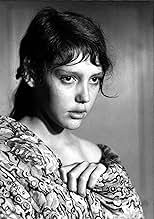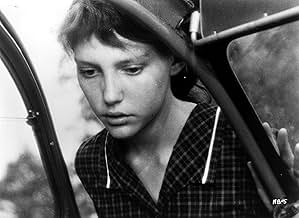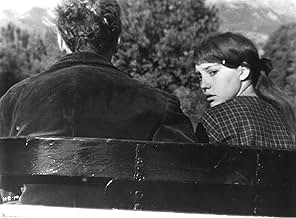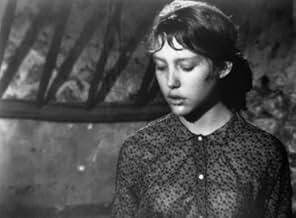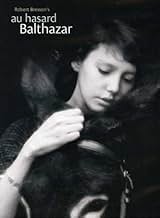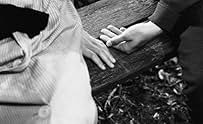Au hasard Balthazar
- 1966
- Tous publics
- 1h 35min
NOTE IMDb
7,7/10
24 k
MA NOTE
L'histoire d'un âne maltraité et des gens qui l'entourent. Étude sur la sainteté et prologue à une autre oeuvre de Bresson, Mouchette.L'histoire d'un âne maltraité et des gens qui l'entourent. Étude sur la sainteté et prologue à une autre oeuvre de Bresson, Mouchette.L'histoire d'un âne maltraité et des gens qui l'entourent. Étude sur la sainteté et prologue à une autre oeuvre de Bresson, Mouchette.
- Réalisation
- Scénario
- Casting principal
- Récompenses
- 7 victoires et 2 nominations au total
Mylène Van der Mersch
- Nurse
- (as Mylène Weyergans)
Avis à la une
To read through most reviews of Balthazar feels like having stepped inside a church with people sighing about god and transcendence, which is a testament to Bresson's power here in his most spiritual work so far. But let me step outside in clear air for a moment.
It was an ongoing project for him, striving for an ascetic eye that purifies. He had began (essentially) with Diary of a Priest, ambitious work about a spiritual journey. But I believe he was troubled by a few things in it, if his next films offer any clue.
He spent the next couple of films completely muting the emotional turmoil evident in Diary, taking all the romanticism out, making them purely about the desire to break free from a prison-world. Pickpocket and Jeanne D'Arc were sketches in that austere direction. But this was setting him down a disastrous path where the only thing purer was was just more and more bare. When does fasting become starving and why is a stone floor purer than a furnished house?
How about we say that his desire to evoke the abstract was laudable, but his dogmatic way of doing it absolutely killed the world in which it lives and hides? His camera murders it. It only managed to take the pure out of life and make a liturgy around its dead body. It was destroying the possibility for cinematic space to support metaphor, inner life, poetry, and to simply be anything other than dead nature. The process of facts alone won't do, they can never convey life, much less pure life.
So I had my sights set on Balthazar as his most pure, most lauded, and expected perhaps to mount a critique of a spirituality that is only its own funeral. But I believe he beat me to the punch. I believe he began to see that he was starving himself, at least so far as the film is different from before.
This is his most lush, his most ambitious since Diary (none of the interim were), his most accomplished and with the most life. His camera doesn't just stare, it moves again and searches. He doesn't just create ellipsis within a scene, he makes it move across the narrative.
A household collapses, but we move to see this in the girl's disastrous relationship with a despicable bully, and we experience the loss of innocence, the fouling of kindness in her world, in Balthazar's treatment at the hands of several callous owners.
At the center Bresson has the most placid, most unassuming actor, a selfless being. It's by reading what we do in Balthazar's eyes that we color the whole and it ripples through and becomes ours. We have the reactions he doesn't and thus humanize ourselves. It's marvelous and it plumbs into something fundamental about how the world is put together that makes it worthy beyond technique.
See, life will break down, sometimes for no other reason than someone changed his mind about a deal and pride. It will break and scatter in pieces, go through the cycle of suffering. The film ends with everything broken, nothing put back together, the girl having left off for a next life somewhere.
What it plumbs is that what we see into these makes a difference. There's abandonment at the end, heartbreak, anonymous loss of a soul that we knew as dear. But I would rather see courage myself. Instead of projecting our human terror into him, take from his capacity to endure. If suffering isn't pain, it's not being able to abide pain; how about there is nothing lost, nothing broken, there is only a time for things to come together and a time to disperse again? Balthazar isn't lost, he has returned, or so it goes maybe.
It was an ongoing project for him, striving for an ascetic eye that purifies. He had began (essentially) with Diary of a Priest, ambitious work about a spiritual journey. But I believe he was troubled by a few things in it, if his next films offer any clue.
He spent the next couple of films completely muting the emotional turmoil evident in Diary, taking all the romanticism out, making them purely about the desire to break free from a prison-world. Pickpocket and Jeanne D'Arc were sketches in that austere direction. But this was setting him down a disastrous path where the only thing purer was was just more and more bare. When does fasting become starving and why is a stone floor purer than a furnished house?
How about we say that his desire to evoke the abstract was laudable, but his dogmatic way of doing it absolutely killed the world in which it lives and hides? His camera murders it. It only managed to take the pure out of life and make a liturgy around its dead body. It was destroying the possibility for cinematic space to support metaphor, inner life, poetry, and to simply be anything other than dead nature. The process of facts alone won't do, they can never convey life, much less pure life.
So I had my sights set on Balthazar as his most pure, most lauded, and expected perhaps to mount a critique of a spirituality that is only its own funeral. But I believe he beat me to the punch. I believe he began to see that he was starving himself, at least so far as the film is different from before.
This is his most lush, his most ambitious since Diary (none of the interim were), his most accomplished and with the most life. His camera doesn't just stare, it moves again and searches. He doesn't just create ellipsis within a scene, he makes it move across the narrative.
A household collapses, but we move to see this in the girl's disastrous relationship with a despicable bully, and we experience the loss of innocence, the fouling of kindness in her world, in Balthazar's treatment at the hands of several callous owners.
At the center Bresson has the most placid, most unassuming actor, a selfless being. It's by reading what we do in Balthazar's eyes that we color the whole and it ripples through and becomes ours. We have the reactions he doesn't and thus humanize ourselves. It's marvelous and it plumbs into something fundamental about how the world is put together that makes it worthy beyond technique.
See, life will break down, sometimes for no other reason than someone changed his mind about a deal and pride. It will break and scatter in pieces, go through the cycle of suffering. The film ends with everything broken, nothing put back together, the girl having left off for a next life somewhere.
What it plumbs is that what we see into these makes a difference. There's abandonment at the end, heartbreak, anonymous loss of a soul that we knew as dear. But I would rather see courage myself. Instead of projecting our human terror into him, take from his capacity to endure. If suffering isn't pain, it's not being able to abide pain; how about there is nothing lost, nothing broken, there is only a time for things to come together and a time to disperse again? Balthazar isn't lost, he has returned, or so it goes maybe.
This is a very important film. It makes you look into yourself and examine your own worth.
The world is not a fair place to live in. It has its own social structures and with each their is a certain perception of worth. Robert Bresson displays these perceptions from the bottom up.
Much like Vittorio DeSica's Umberto D, this film intertwines the relationship between man and beast. But who is the beast? It's society.
With images shot in crisp black and white Robert Bresson reveals the sordidness of the human soul, how cruel, selfish, pathetic, and unjust it can be. Au Hasard Balthazar is not an easy film to watch, but its honesty and approach towards society's injustices make it a must see.
The world is not a fair place to live in. It has its own social structures and with each their is a certain perception of worth. Robert Bresson displays these perceptions from the bottom up.
Much like Vittorio DeSica's Umberto D, this film intertwines the relationship between man and beast. But who is the beast? It's society.
With images shot in crisp black and white Robert Bresson reveals the sordidness of the human soul, how cruel, selfish, pathetic, and unjust it can be. Au Hasard Balthazar is not an easy film to watch, but its honesty and approach towards society's injustices make it a must see.
Born into a world of despair, pain and fear, with a back to carry allsorts on and two eyes to fill with tears, abused and often put upon, never knowing where things might have gone, but conforming to the stick and whip, while no one hears your prayers.
Poor old Balthazar doesn't know which way to turn, on occasions folks are kind and free, at other times they let him burn, but why are they so changeable, what makes these people tick, is it natural that their spirit is to hurt, with pain inflict.
The hazards of being a young woman growing up in rural France and the challenges of a donkey with the same backdrop, both brilliantly performed by the donkey and Anne Wiazemsky, who leave you under no illusion of the suffering they have to endure.
Poor old Balthazar doesn't know which way to turn, on occasions folks are kind and free, at other times they let him burn, but why are they so changeable, what makes these people tick, is it natural that their spirit is to hurt, with pain inflict.
The hazards of being a young woman growing up in rural France and the challenges of a donkey with the same backdrop, both brilliantly performed by the donkey and Anne Wiazemsky, who leave you under no illusion of the suffering they have to endure.
For all its formal brilliance, this is one of the least watchable films in the world, despite its enchanted opening and fairy tale elements. Seen through the eyes of a much-abused donkey, we are treated to a litany of corruption, legal (a man is accused of fraud), social (provincial France has never seemed so pinched, arid, spiritually void, with its inhabitants leading lives, in Joyce's words, of 'quiet desperation'), criminal (a gang of violent teenage smugglers), and personal (the leader of said gang rapes, with his cronies, his girlfriend, then locks her up naked), as well as a murder and suicide. What makes this possibly bearable is the limpidity and formal beauty of Bresson's style, and admirers refer to his pinpointing spiritual grace in human suffering, but I wouldn't count on it.
The film's ending is one of the most memorable in cinema, and achieves an eerie grace, consistent with its almost unique tone - allusively Biblical and allegorical, yet resistant to specific meanings and interpretations. The plot is a narrative of human cruelty and escalating despair, but always with enough mystery in the motivation to ward off easy condemnations; and perhaps even to indicate divine guidance. Throughout, Wiazemsky seizes on the donkey as a symbol of transcendence(her mother calls it a saint in the end); it's formally christened at the beginning and undergoes something approaching a formal funeral, all of which gives its life the contours of a spiritual journey of discovery. The narrative encompasses both revelations (the interlude in the fair; new tortures like the mean old man who starves and beats him) and retrenchment; both life's austerity, its roots in servitude, and its enormous potential dignity. Never was a donkey filmed so evocatively - but as always with Bresson, the simplicity is thrilling too - there's no false artistry here; no dubious anthropomorphism. A necessary film, and I'm amazed that I'm the first one to be commenting on it here.
Le saviez-vous
- AnecdotesBalthazar was an untrained donkey during most of the filming, which made Robert Bresson's work a real challenge. The only scene for which the donkey was trained was the circus math trick.
- GaffesIn the very last shot of the film the shadow of the camera man or someone else enters the picture from the bottom right.
- Citations
Gerard: Lend him to us.
Marie's mother: He's worked enough. He's old. He's all I have.
Gerard: Just for a day.
Marie's mother: Besides, he's a saint.
- Versions alternativesRestored in 2014 from the original 35mm negative by the Éclair Group and L.E. Diapason.
- ConnexionsEdited into Histoire(s) du cinéma: Seul le cinéma (1994)
- Bandes originalesPiano Sonata No.20 in A Major, II. Andantino (D. 959)
Music by Franz Schubert
Performed by Jean-Joël Barbier
Meilleurs choix
Connectez-vous pour évaluer et suivre la liste de favoris afin de recevoir des recommandations personnalisées
- How long is Au hasard Balthazar?Alimenté par Alexa
Détails
Box-office
- Montant brut aux États-Unis et au Canada
- 45 406 $US
- Week-end de sortie aux États-Unis et au Canada
- 8 436 $US
- 19 oct. 2003
- Montant brut mondial
- 45 406 $US
- Durée
- 1h 35min(95 min)
- Couleur
- Mixage
- Rapport de forme
- 1.66 : 1
Contribuer à cette page
Suggérer une modification ou ajouter du contenu manquant


